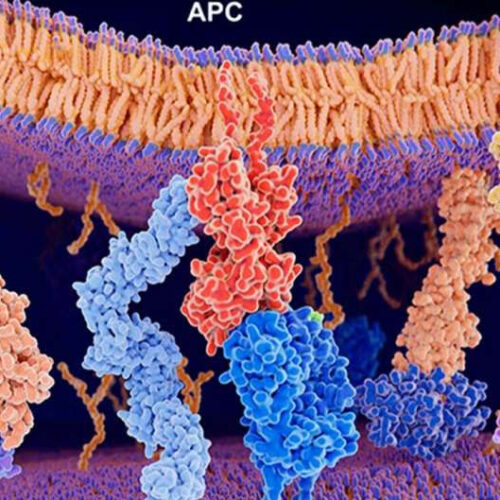by UT Southwestern Medical Center Activation of T cell immune response with the interaction of MHC-II (red) with the T cell receptor (TCR, blue), and also CD4 (light blue). CD4 and MHC-II are proteins expressed by T cells and antigen-presenting cells, respectively, to aid the recognition of antigens by TCRs. Credit: UT Southwestern Medical Center....
Tag: <span>anti-cancer immunity</span>
Timed release of turmeric stops cancer cell growth
by Tina Hilding, Washington State University A Washington State University research team has developed a drug delivery system using curcumin, the main ingredient in the spice turmeric, that successfully inhibits bone cancer cells while promoting growth of healthy bone cells. The work could lead to better post-operative treatments for people with osteosarcoma, the second most prevalent cause of cancer death in children. The...
The body’s defence mechanisms: Teamwork is key for cancer-fighting proteins
The mechanisms that orchestrate the functions of our bodies and keep us healthy are quite complex, involving critical molecular components that are still poorly understood. The prestigious journal Nature Communications has published recent research on this topic by a team led by Dr. El Bachir Affar, a professor in the Department of Medicine, Faculty of Medicine at the Université...
Could less deadly therapies be a better way to keep cancer in check?
While many cancer therapies initially can be very successful, tumors often return and spread when remaining cancer cells develop resistance to treatment. To combat this tendency, Frédéric Thomas of the French National Centre for Scientific Research proposes that cancer researchers take a lesson from our own immune system and explore “natural adaptive therapies.” Such an...
Newly created compound boosts anti-cancer immunity
Scientists might have found a way to activate the body’s “natural killer T cells” in the fight against cancer. The findings might lead to more effective treatments that stop cancer from spreading. Sometimes, our T cells (shown here attacking a cancer cell) can do with a little help. The new study — now published in the...

